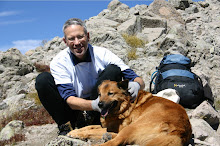
When you turn onto Utah 211, you have the sense that you're near the end of the earth. For one thing, you haven't seen a house for miles and miles. There are no lights showing. There's a strand of barbed wire fence, sketchy cell phone service, almost no cars, definitely no towns. I mean, you're on your own if you break down out there. And then, there's this sign: "Canyonlands National Park: Needles District", and Utah 211. That's it. Oh, and that the road goes 34 miles. No outlet.


And the longer one is there, the "sign" of Canyonlands grows louder. It is a place that points beyond itself, reminding us that we are powerless, small, insignificant in the grand scheme of things. . . unless of course the One who fashioned all of this fashioned us as well. And more than simply creating us that He spoke us into being as the very crown of the beauty and creation we are walking dumbfounded in. We find ourselves honored in such places as the very best of what He has made, and yet, reminded that we would do well to receive this honoring with an abject humility. In the end it is all about God who made us.

If you don't get it at the intersection, you get it as you drive towards the Park. There is one house 3 miles in, old Marie's House, the lady who started a cult and planted it here on the top of the first rise. But after that, there's nothing. Not a telephone pole, not a store, not a house, not a human created light. No phone service, no intersecting roads, seldom a car coming up behind you or coming at you. You're alone, more alone then many of us have ever been in our whole lives. And to tell you the truth, the first time you do it, it's unnerving, especially for those who grew up in a city or in the East where there are people everywhere.
Along the way you pass through a gallery of monoliths, huge red rock sentinels, mesas called collectively the Vermillion Cliffs, where I think Tom Cruise was filmed in his free climb at the beginning of Mission:Impossible. And if you're lucky, the only people you'll see on your drive in are rock climbers 300 feet up, with hands jammed into the vertical cracks in these cliffs. It'll take your breath away. But what it adds to is the sense that you are out on an edge, far from the familiar, stripped of most of what you've come to trust for your health and stability and security.
At last, you cross the National Park Boundary, and the thought is, "Now at last all will be well. People, services, lights." But as you pass the one lone person in the entrance booth, you miss the Visitors' Center because it's so well hidden and blending in with the scenery, and there's only 5 people there anyway, and you drive to your camping spot, get out of your car to. . . silence. No car sounds, no airplane sounds, no people sounds, no sound at all. And you realize for the first time that maybe, just maybe, Canyonlands Needles is a sign. A sign that points to your desperate need for silence and absence of distraction. A place of such total wilderness that you might find God there, because there's nothing left to get in the way.

When you finally get the chance to hike, the sense of sign intensifies. The beauty is enormous, huge, breathtaking. A lot of it has to do with contrast. A tree growing out of a rock isn't simply incongruous and unexpected; it thrust the color of flora life into the very different color of red rocks. The life in the desert is a sign of the beauty of God. It teaches us to have eyes to see Him in the midst of that which we may have been lured to believe is a wasteland.

And the longer one is there, the "sign" of Canyonlands grows louder. It is a place that points beyond itself, reminding us that we are powerless, small, insignificant in the grand scheme of things. . . unless of course the One who fashioned all of this fashioned us as well. And more than simply creating us that He spoke us into being as the very crown of the beauty and creation we are walking dumbfounded in. We find ourselves honored in such places as the very best of what He has made, and yet, reminded that we would do well to receive this honoring with an abject humility. In the end it is all about God who made us.

As C.S.Lewis said, "these manifestations [that is, you and me, in addition to the hoodoos of Canyonlands] are not the hope of glory, they are an exposition of the glory itself." Canyonlands are a sign, you see, that point to the hope of glory.
So, when you see the sign for Utah 211, make the turn. But remember, what lies ahead are signs which are far more important.
